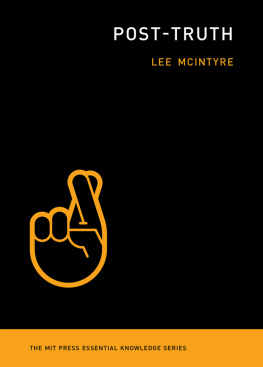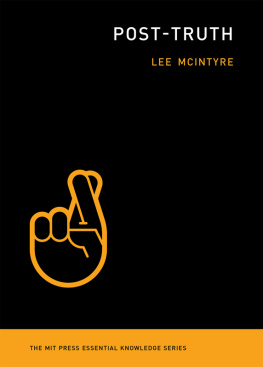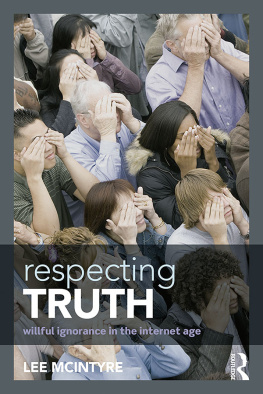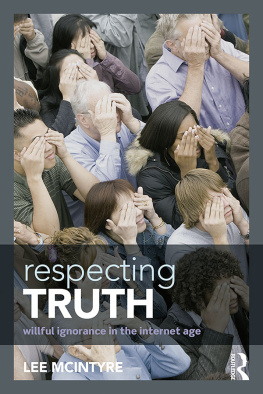McIntyre Lee (author) - How to Talk to a Science Denier
Here you can read online McIntyre Lee (author) - How to Talk to a Science Denier full text of the book (entire story) in english for free. Download pdf and epub, get meaning, cover and reviews about this ebook. year: 1901, publisher: The MIT Press., genre: Religion. Description of the work, (preface) as well as reviews are available. Best literature library LitArk.com created for fans of good reading and offers a wide selection of genres:
Romance novel
Science fiction
Adventure
Detective
Science
History
Home and family
Prose
Art
Politics
Computer
Non-fiction
Religion
Business
Children
Humor
Choose a favorite category and find really read worthwhile books. Enjoy immersion in the world of imagination, feel the emotions of the characters or learn something new for yourself, make an fascinating discovery.

- Book:How to Talk to a Science Denier
- Author:
- Publisher:The MIT Press.
- Genre:
- Year:1901
- Rating:5 / 5
- Favourites:Add to favourites
- Your mark:
- 100
- 1
- 2
- 3
- 4
- 5
How to Talk to a Science Denier: summary, description and annotation
We offer to read an annotation, description, summary or preface (depends on what the author of the book "How to Talk to a Science Denier" wrote himself). If you haven't found the necessary information about the book — write in the comments, we will try to find it.
How to Talk to a Science Denier — read online for free the complete book (whole text) full work
Below is the text of the book, divided by pages. System saving the place of the last page read, allows you to conveniently read the book "How to Talk to a Science Denier" online for free, without having to search again every time where you left off. Put a bookmark, and you can go to the page where you finished reading at any time.
Font size:
Interval:
Bookmark:
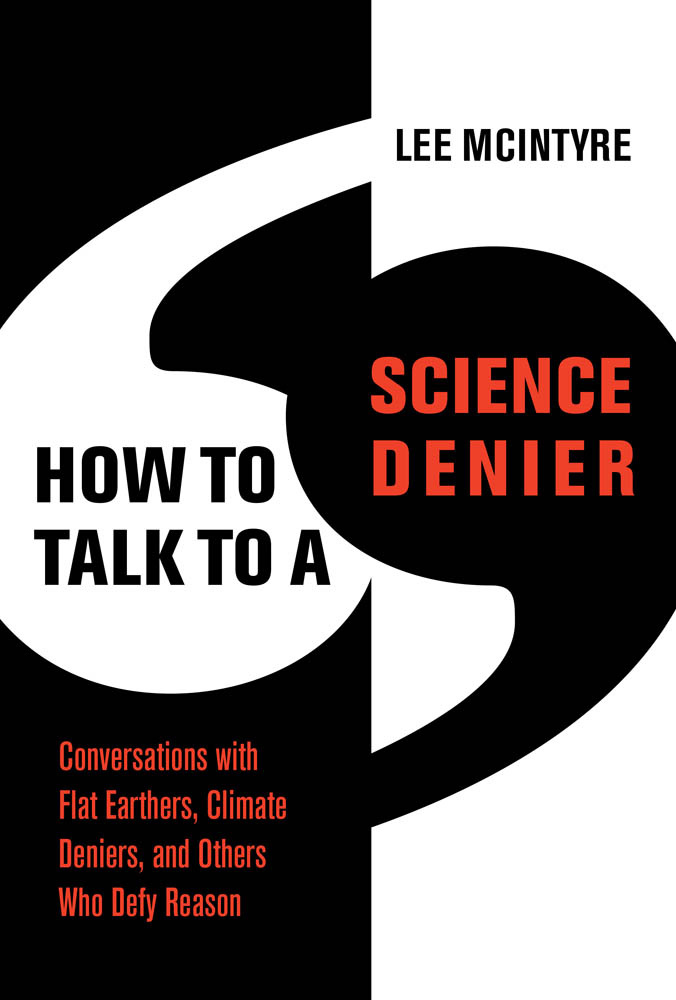
How to Talk to a Science Denier: Conversations with Flat Earthers, Climate Deniers, and Others Who Defy Reason
Lee McIntyre
The MIT Press
Cambridge, Massachusetts
London, England
2021 The Massachusetts Institute of Technology
All rights reserved. No part of this book may be reproduced in any form by any electronic or mechanical means (including photocopying, recording, or information storage and retrieval) without permission in writing from the publisher.
Library of Congress Cataloging-in-Publication Data
Names: McIntyre, Lee C., author.
Title: How to talk to a science denier: conversations with flat earthers, climate deniers, and others who defy reason / Lee McIntyre.
Description: Cambridge, Massachusetts : The MIT Press, [2021] | Includes bibliographical references and index.
Identifiers: LCCN 2020050478 | ISBN 9780262046107 (hardcover)
Subjects: LCSH: ScienceSocial aspects. | SciencePublic opinion. | Pseudoscience. | Truthfulness and falsehood. | Reasoning.
Classification: LCC Q175.5 .M3954 2021 | DDC 306.4/5dc23
LC record available at https://lccn.loc.gov/2020050478
d_r0
For Mohamad Ezzeddine Allaf, MD A healer
A man with a conviction is a hard man to change. Tell him you disagree and he turns away. Show him facts or figures and he questions your sources. Appeal to logic and he fails to see your point.
Leon Festinger, When Prophecy Fails (1956)
It is easier to fool people than to convince them that they have been fooled.
Mark Twain (attributed)
- Fabricated data used as stimuli in an experiment by Kahan et al., Motivated Numeracy and Enlightened Self-Government (2013).
- Fabricated data used as stimuli in an experiment by Kahan et al., Motivated Numeracy and Enlightened Self-Government (2013).
- Top 100 producers and their cumulative greenhouse gas emissions from 1988 to 2015
- Data from the CDP, CDP Carbon Majors Report 2017, cdp.net
I admit, I hesitated when I first put on the lanyard Id received from a smiling young woman in a white lab coat staffing the check-in table at the Flat Earth International Conference 2018. I wondered if anyone would recognize mewas that someone taking pictures? But then again, why would they? Id been sitting in my office studying science denial for the last fifteen years. With my flannel shirt and badge, I looked just like the rest of them. It was the cloak of invisibility I needed for a philosopher of science gone undercover, at least for the first twenty-four hours.
After that, I would be ready to make my move
Suddenly, I felt a hand on my shoulder and turned to find a man in a black T-shirt, smiling with an outstretched hand. His shirt said NASA LIES.
Hey, welcome, Lee, he said. So tell me, how did you get into Flat Earth?
For a number of years it has been fairly clearat least in the United Statesthat truth is under assault. Our fellow citizens dont seem to listen to facts anymore. Feelings outweigh evidence, and ideology is ascendant. In an earlier book, I explored the question of whether we now live in a post-truth era, where facts and even reality itself are up for grabs and what the consequences of that might be.
The political mess in Washington will be with us for a while. But the fallout for science is already an emergency. A recent report from the United Nations Intergovernmental Panel on Climate Change (IPCC) warns that we have reached a dangerous tipping point. Unfortunately, millions agree with him.
How do we reach them? How can we get people to change their minds based on facts? It has sometimes been thought that you cant. In fact, some have said that trying to do so would lead to a backfire effect, where wed make the problem worse by causing partisans to double down on their mistaken beliefs. Yes, people are stubborn and resist the idea of changing their beliefs based on facts, but for most change is possible. And if we dont try, things will only get worse.
In one of the most exciting recent developments, in June 2019, a landmark study was published in the journal Nature Human Behaviour that provided the first empirical evidence that you can fight back against science deniers.
Unfortunately, there is one crucial thing that Schmid and Betsch left out. There are essentially three possible levels of engagement with science deniers: inoculation, intervention, and overturning belief. Schmid and Betsch dealt only with the first two. In a sympathetic commentary that ran in the same issue of Nature Human Behaviour, Sander van der Linden explains that Schmid and Betschs methodology could be useful to pre-identify the bogus techniques that science deniers use, in an attempt to pre-bunk them, so that their impact on a potential audience can be mitigated. Second, Schmid and Betsch demonstrate that even when participants have recently been exposed to scientific misinformation, it is effective to immediately intervene and explain the faulty reasoning, before mistaken beliefs have time to set in cement. Both pre-bunking and debunking are potentially powerful tools that are vindicated by their findings. What the researchers did not do, however, was measure whether it was possible to overturn the beliefs of hard-core science deniers, especially those who had already been exposed to years worth of scientific misinformation. Schmid and Betsch (and van der Linden) brilliantly deal with the audience for science deniers but what about those who were already committed science deniers before they participated in the study?
Here, unfortunately, the empirical literature leaves us adrift. Anecdotal accounts have suggested that the best way of convincing someone to change their beliefs is through direct personal engagementbut the Schmid and Betsch study was all done online. Yet doesnt it make sense that if we are trying to convince people to change their minds, it would help to build some trust first? Most beliefs are formed within a social context (and not based solely on facts), so shouldnt social context matter in changing them? In his important essay How to Convince Someone When Facts Fail, professional skeptic and historian of science Michael Shermer recommends the following strategy:
From my experience, (1) keep emotions out of the exchange, (2) discuss, dont attack (no ad hominem or ad Hitlerum), (3) listen carefully and try to articulate the other position accurately, (4) show respect, (5) acknowledge that you understand why someone might hold that opinion, and (6) try to show how changing facts does not necessarily mean changing worldviews.
If you listen to the stories of science deniers who have altered their beliefs, they universally report the positive influence of someone they trust. Someone who built a personal relationship with them and took their doubts seriously, then shared the evidence. Facts alone were not enough. In two recent reports on overcoming vaccine denial, former anti-vaxxers (or at least those who were vaccine-hesitant) report having had their outlook changed by people who sat down with them, listened to all of their questions, and explained the answers with ample patience and respect. During the 2019 measles outbreak in Clark County, Washington, the state government sent public health officials out to meet with parents in small groups or one-on-one, sometimes for hours at a time, to answer their questions. As a result, one woman reported having changed her mind, deciding to give her kids the shots after a doctor at a vaccine workshop answered her questions for more than two hours, at one point drawing diagrams on a whiteboard to explain cell interaction. He was thoughtful, factual and also still very warm, she said.
Font size:
Interval:
Bookmark:
Similar books «How to Talk to a Science Denier»
Look at similar books to How to Talk to a Science Denier. We have selected literature similar in name and meaning in the hope of providing readers with more options to find new, interesting, not yet read works.
Discussion, reviews of the book How to Talk to a Science Denier and just readers' own opinions. Leave your comments, write what you think about the work, its meaning or the main characters. Specify what exactly you liked and what you didn't like, and why you think so.



